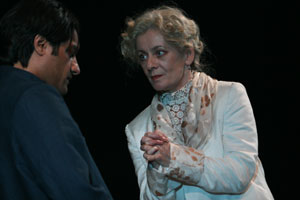Set in the early 1900s, this production tells the story of an Englishwoman in India, and her political role in the home rule campaign. The key characters include Annie Besant, her devoted student Sidra, her adopted son Krishnamurti and his father Narayaniah. The play is narrated by the older version of Sidra, as she looks back and reflects on ‘Amma’s’ life.
The title alludes to how Annie is portrayed in the play – not always in a flattering way, as she is often ‘mistaken’. Her decline as a political power in India was driven in part by her disagreements with Ghandi, her attempts at authoritarian leadership and her approval of police violence. On a personal level, the rejection of theosophy by her son Krishna whom she had touted as the messiah to bring theosophy to India marred her later years.
The complexity of the play is sometimes challenging, as it tries to explain everything from Annie’s early personal history, to the concept of Theosophy and the political issues in India. Some prior knowledge of any (or all of) these issues would benefit audience members, though the programme notes do help.
Sidra (played by Ruby Sahota), her older self (Vayu Naidu) and Narayaniah (Ranjit Krishnamma) are particularly well acted, while Annie and Krishna could have been more charismatic given their political and spiritual roles.
‘Mistaken… Annie Besant in India’ is an interesting historical account of the life and death of Annie, though is more of a story (or lecture) than a play. It was commissioned for the 60th anniversary of Indian Independence, and will likely resonate with those who have a particular connection or interest in this important time in India’s history.
The production is currently touring and will be in Birmingham and London next.
The title alludes to how Annie is portrayed in the play – not always in a flattering way, as she is often ‘mistaken’. Her decline as a political power in India was driven in part by her disagreements with Ghandi, her attempts at authoritarian leadership and her approval of police violence. On a personal level, the rejection of theosophy by her son Krishna whom she had touted as the messiah to bring theosophy to India marred her later years.
The complexity of the play is sometimes challenging, as it tries to explain everything from Annie’s early personal history, to the concept of Theosophy and the political issues in India. Some prior knowledge of any (or all of) these issues would benefit audience members, though the programme notes do help.
Sidra (played by Ruby Sahota), her older self (Vayu Naidu) and Narayaniah (Ranjit Krishnamma) are particularly well acted, while Annie and Krishna could have been more charismatic given their political and spiritual roles.
‘Mistaken… Annie Besant in India’ is an interesting historical account of the life and death of Annie, though is more of a story (or lecture) than a play. It was commissioned for the 60th anniversary of Indian Independence, and will likely resonate with those who have a particular connection or interest in this important time in India’s history.
The production is currently touring and will be in Birmingham and London next.




